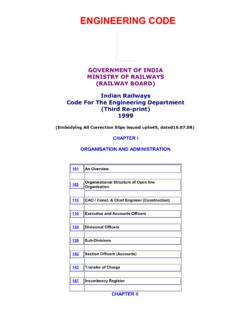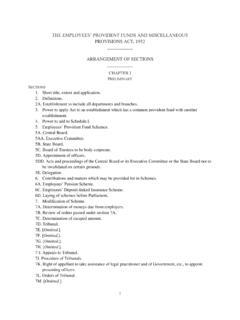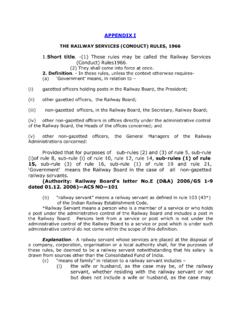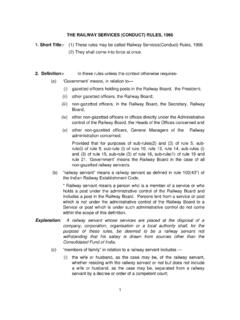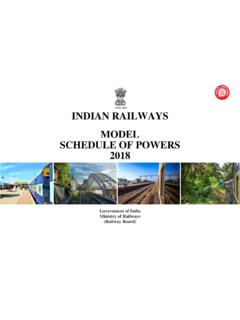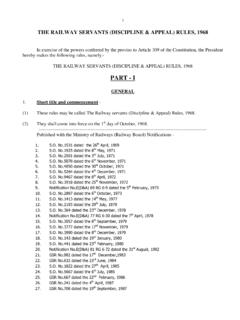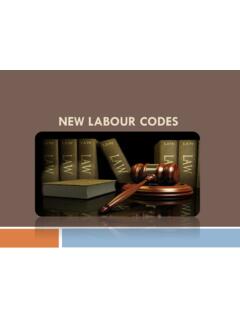Transcription of Industrial Employment Standing Orders Rules
1 Industrial Employment ( Standing Orders ) CENTRAL Rules , 1946 Notification No. 11 (37), date the 18th December, 1946 In exercise of the powers conferred by Section 15, read with clause (b) of Section 2 of the Industrial Employment ( Standing Orders ) Act, 1946 (XX of 1946), the Central Government is pleased to make the following Rules , the same having been previously published as required by sub-section (1) of the said Section 15, namely : 1. (1) These Rules may be called the Industrial Employment ( Standing Orders ) Central Rules , 1946, 1[(2) They extend to all Union territories, and shall also apply in any State (other than a Union territory) to Industrial establishments under the control of the Central Government or a Railway administration or in a major port, mine or oilfield]. 2. In these Rules , unless there is anything repugnant in the subject or context : (a) Act means the Industrial Employment ( Standing Orders ) Act, 1946 (XX of 1946); (b) Form means a form set out in Schedule II appended to these Rules .
2 2[2-A. In the Schedule to the Act, after Item 10, the following additional matters which shall be applicable to Industrial establishments in coal mines only, shall be inserted ,namely :- 10-A. Additional matters to be provided in Standing Orders relating to Industrial establishments in coal mines :- (1) Medical aid in case of accident. (2) Railway travel facilities. (3) Method of filling vacancies. (4) Transfers. (5) Liability of manager of the establishment or mine. (6) Service certificate. (7) Exhibition and supply of Standing Orders . ] 3[3. (1) Save as other wise provided in sub-rule (2), the Model Standing Orders for the purposes of the Act shall be those set out in Schedule I appended to these Rules . (2) The Model Standing Orders for the purposes of the Act in respect of Industrial establishment in coal mines shall be those set out in Schedule I- A appended to these Rules .]
3 4. An application for certification of Standing Orders shall be made in Form I. 5. The prescribed particulars of workmen for purposes of sub-section (3) of Section 3 of the Act shall be- (1) total number employed, 2) number of permanent workmen, (3) number of temporary workmen, 4[(3-A) number of casual Workmen,] (4) number of badlis or substitutes, (5) number of probationers, (6) number of apprentices, (7) name of the trade union, or trade unions, if any, to which the workmen belong, (8) remarks. 6. As soon as may be after he receives an application under Rule 4 in respect of an Industrial establishment , the Certifying Officer shall- 1 Subs. By No. 208, dated 31-1-1954.
4 2 Subs. by No. 732, dated 12-5-1971. 3 Subs. by No. 732, dated 12-5-1971 No. 556, dated 24-2-1956. (a) Where there is a trade union of the workmen, forward a copy of the draft Standing Orders to the trade union together with a notice in Form II; (b) where there is no such trade union, call a meeting of the workmen to elect three representatives, to whom he shall, upon their election, forward a copy of the draft Standing Orders together with a notice in Form II. 7. Standing Orders certified in pursuance of sub-section (3) of Section 5 or sub-section (2) of Section 6 of the Act shall be authenticated by the signature and seal of office of the Certifying Officer or the appellate authority as the case maybe, and shall be forwarded by such officer or authority within a week of authentication by registered letter post to the employer and to the trade union, or, as the case may be, the representatives of the workmen elected in pursuance of Rule.
5 6. 5[7-A. (1) Any person desiring to prefer an appeal in pursuance of sub-section (1) of Section 6 of the Act shall draw up a memorandum of appeal setting out the grounds of appeal and forward it in quintuplicate to the appellate authority accompanied by a certified copy of the Standing Orders , amendments or modifications, as the case may be. 6[The memorandum of appeal shall be in Form IV set out in Schedule II to these Rules .] (2) The appellate authority shall, after giving the appellant an opportunity of being heard, confirm the Standing Orders , amendments or modifications as certified by the Certifying Officer unless it considers that there are reasons for giving the other parties to the proceedings a hearing before a final decision is made in the appeal. (3) Where the appellate authority does not confirm the Standing Orders , amendments or modifications it shall fix a date for the hearing or the appeal and direct notice thereof to be given (a)where the appeal is filed by the employer or a workman, to trade unions of the workmen of the Industrial establishments, and where there are no such trade unions to the representatives of workmen elected under clause (b) of Rule 6, or as the case may be, to the employer ; (b) where the appeal is filed by a trade union, to the employer and all other trade unions of the workmen of the Industrial establishment ; (c) where the appeal is filed by the representatives of the workmen, to the employer and any other workmen whom the appellate authority joins as a party to the appeal.]
6 (4) The appellant shall furnish each of the respondents with a copy of the memorandum of appeal. (5) The appellate authority may at any stage call for any evidence it considers necessary for the disposal of the appeal. (6) On the date fixed under sub-rule[ (3) for the hearing of the appeal, the appellate authority shall take such evidence as it may have called for or consider to be relevant.] 8. The register required to be maintained by Section 8 of the Act shall be in Form III and shall be properly bound, and the Certifying Officer shall furnish a copy of Standing Orders approved for an Industrial establishment to any person applying there for on payment 7[calculated at all following rates per copy- (i) for the first two hundred words or less, seventy-five paisa ; (ii) for every additional one hundred words or fraction thereof, thirty-seven paisa : Provided that, where the said Standing Orders exceeds five pages, the approximate number of words per page shall be taken as the basis for calculating the total number of words to the nearest hundred, for the purpose of assessing the copying fee.]
7 ] SCHEDULE I 8[MODEL Standing Orders IN RESPECT OF Industrial ESTABLISHMENTS NOT BEING Industrial ESTABLISHMENTS IN COAL MINES] 1. These Orders shall come into force 5 Ins by 1166, dated 28th June 1963 6 Ins. by No. 732, dated 12-5-1971. 7 Subs. by Noti. 1573, dated 10-10-1967. 8 Subs. by No. 732, dated 12-5-1971. 2. Classification of (a) Workmen shall be classified as -- (1) permanent, (2) Probationers, (3) badlis, (4) temporary, (5) casual, (6) apprentices. (b) A permanent workman is a workman who has been engaged on a permanent basis and includes any person who has satisfactorily completed a probationary period of three months in the same or another occupation in the Industrial establishment , including breaks due to sickness, accident, leave, lock-out, strike (not being an illegal strike) or involuntary closure of the establishment .
8 (c) A probationer is a workman who is provisionally employed to fill a permanent vacancy in a post and has not completed three months service therein. If a permanent employee is employed as a probationer in a new post he may, at any time during the probationary period of three months, be reverted to his old permanent post. (d) A badli is a workman who is appointed in the post of a permanent workman or probationer who is temporarily absent. (e) A temporary workman is a workman who has been engaged for work which is of an essentially temporary nature likely to be finished within a limited period. (f) A casual workman is a workman whose Employment is of a casual nature. (g) An apprentice is a learner who is paid an allowance during the period of his training. 3. (1) Every workman shall be given a permanent ticket unless he is a probationer, badli, temporary worker or apprentice.
9 (2) Every permanent workman shall be provided with a departmental ticket showing his number, and shall, on being required to do so, show it to any person authorized by the manager to inspect it. (3) Every badli shall be provided with the badli card on which shall be entered the days on which he has worked in the establishment , and which shall be surrendered if he obtains permanent Employment . (4) Every temporary workman shall be provided with a temporary ticket which he shall surrender on his discharge. (5) Every casual worker shall be provided with a casual card, on which shall be entered the days on which he has worked in the establishment . (6) Every apprentice shall be provided with an apprentice card, which shall be surrendered if he obtains permanent Employment .
10 4. Publication of working periods and hours of work for all classes of workers in each shift shall be exhibited in English and in the principal languages of workman employed in the establishment on notice-boards maintained at or near the main entrance of the establishment and at the time-keeper s office, if any. 5. Publication of holidays and pay-days. Notices specifying (a) the days observed by the establishment as holidays, and (b) pay-days shall be pasted on the said notice-boards. 6. Publication of wage rates. Notices specifying the rates of wages payable to all classes of workman and for all classes of work shall be displayed on the said notice-boards. 7. Shift than one shift may be worked in a department or departments or any section of a department of the establishment at the discretion of the employer.


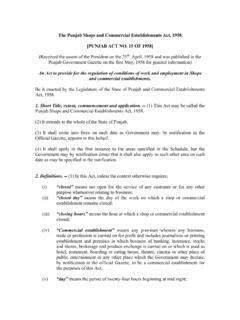

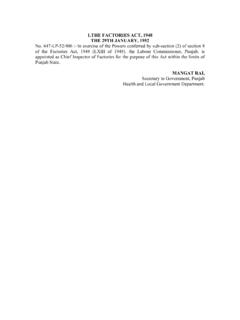

![FORM – I [See sub-rule (1) of rule 7]](/cache/preview/b/b/9/e/e/c/5/4/thumb-bb9eec54cfe6edb00b094586f881a8ef.jpg)

